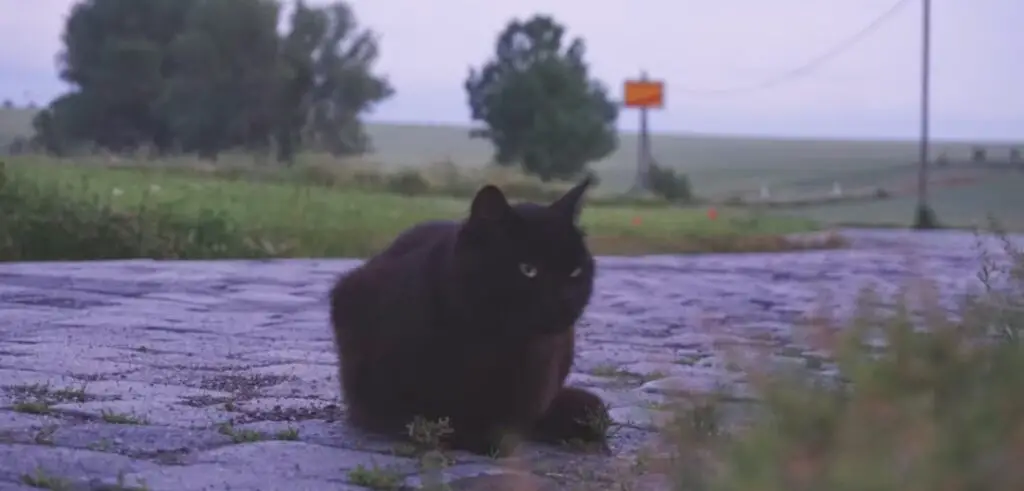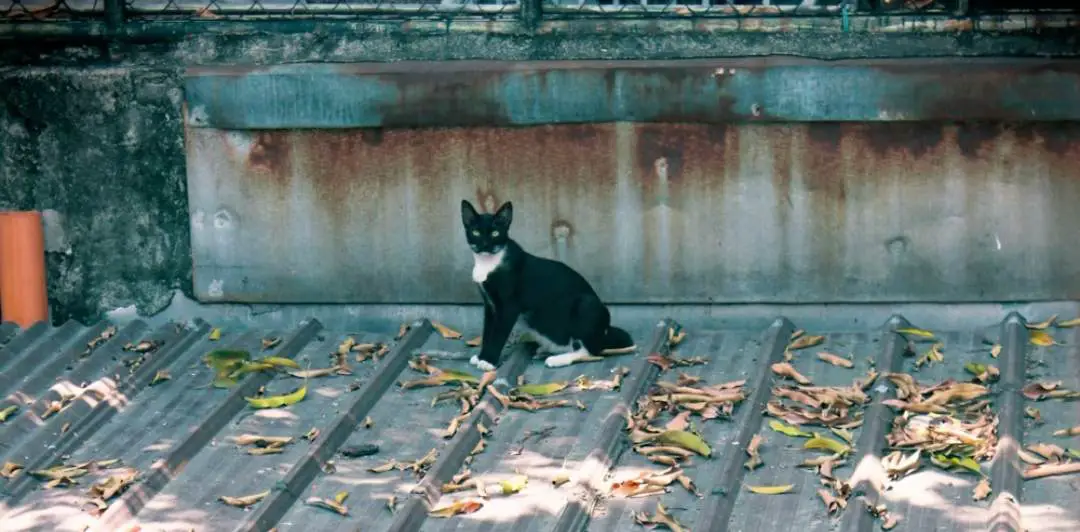Is your outdoor cat missing for a week, and you’re starting to worry? Let’s talk about it…
As a cat owner, I understand the anxiety and concern that comes with a furry family member going AWOL.
In this article, I’ll provide you with valuable tips and strategies to help increase the chances of finding your beloved feline friend and bringing them back home safe and sound.
Outdoor Cat Missing For a Week

It is not always easy to know that your cherished outdoor cat has gone missing for a full week, I once had such an experience.
In such a situation, you may feel a great deal of anxiety and worry about their whereabouts, wondering where they might be exploring and hoping against hope that they will come home safely.
Nevertheless, don’t give up hope; you need to get involved in your neighborhood, post on local social media groups, and hang flyers to raise awareness of your beloved outdoor cat.
With any luck and the help of others, your brave cat might soon return home after a while.
In my opinion, there are just many reasons your outdoor cat can be missing for a week or more, which are as follows:
1. Cat Was Exploring New Territory: From my experience, I can tell you that outdoor cats frequently venture out on exciting adventures and scout out new areas.
During this process of scouting and for the fact that cats are inherently inquisitive beings, they occasionally go further than anticipated in their investigations.
It’s possible that your cat wandered off into unknown territory and became lost, this means they may be stuck there for a while.
They might have been also drawn in by the attraction of unfamiliar places, enticing smells, or even the call of a possible playmate.
My thoughts: In my opinion, you should consider building a secure, enclosed outside area for your cat to explore in order to stop this from happening.
This can be accomplished by putting in a cat enclosure or building a fence-secure backyard.
If your cat is adventurous, you may also want to think about tracking their locations using a GPS tracking collar.
2. Looking for a Mate: While searching for a partner, the majority of outdoor cats frequently disappear for days or even weeks at a time.
Keep in mind that cats are renowned for being independent animals, and it’s in their nature to look for possible mates.
Also, cats become more intrepid during the mating season, which varies by area, and may venture far from their typical territories in quest of a mate.
My thoughts: You should consider having your outdoor cat spayed or neutered to stop them from running off in search of a partner.
This lessens the need for cats to travel and also aids in population management.
In my opinion, spaying or neutering your cat can help minimize their instinctual drive to find a mate and decrease their chances of going missing for extended periods.
3. Territorial Dispute: Due to their territorial nature, outdoor cats frequently go missing after getting into fights with other stronger cats.
Keep in mind that cats that share overlapping territories may fight over territory or have violent encounters.
These fights or arguments over such territory may intensify to the point where one cat feels compelled to flee or locate a safer spot, which results in their prolonged absence from their regular settings.
My thoughts: If you want to keep your cat out of territorial conflicts, you should attempt to detect possible dangerous places in your neighborhood.
Watch out for other stronger cats that might be invading your cat’s territory and take action to deter them from approaching your home.
Additionally, providing your cat with a safe and secure outdoor space, such as a catio or enclosed garden, can help minimize their chances of getting into conflicts with other cats.
4. Cat Got Trapped Somewhere: Being naturally curious animals, cats occasionally get themselves stuck in unexpected places as a result of their discoveries.
They might accidentally go into the garages, crawl spaces, or sheds of their neighbors and be unable to escape.
Cats can unintentionally lock themselves inside a structure or car, which can make their absence last longer.
My thoughts: It’s crucial to constantly scan your surroundings for any potential hiding places or areas where your cat could become stuck, in order to keep them from becoming stuck.
Make sure your cat cannot access sheds, garages, or other areas unless they are locked securely.
If your cat frequently wanders onto other people’s land, you might want to have a conversation with your neighbors and kindly request that they maintain their areas cat-proof.
5. Cat Was Chased Away By Cat Haters: Unfortunately, there are people who detest cats for a variety of reasons, maybe they’re allergic, or maybe they just don’t like having them around.
These people who despise cats occasionally might decide to drive outside cats out of their domains.
Both the cat and its owner may find this upsetting, this can lead to your outdoor cats missing for a week or more.
My thoughts: It is crucial to have a thorough awareness of your community and its residents in order to stop this from occurring.
Make friends with your neighbors and talk to them about your worries about your cat’s security.
Developing good relationships with people in your immediate vicinity may help you handle any possible problems before they get out of hand.
Additionally, think about setting up a secure outside space for your feline companion.
This can involve erecting cat enclosures or fencing, offering plenty of hiding places, and making sure there are no easy-to-access escape routes for outsiders.
You can reduce the likelihood that someone who despises cats would chase your cat away by adopting these safety measures.
6. The Cat Was Chased Away By A Predator: There are many predators in the natural world, and outdoor cats are sadly not immune to their attention.
Cats who are not cautious may find themselves in danger from larger predators like foxes, coyotes, or even birds of prey.
In more extreme situations, the cat may be hurt or killed in these interactions, or it may be chased away.
If chased away, the cat may hang around for a while before returning home to their owners.
My thoughts: It’s critical to be aware of potential threats in your region to safeguard your cat from becoming prey.
Examine the local fauna and speak with specialists to determine which predators are dangerous.
Use lockable cages or supervised outside time to provide a safe outdoor environment for your cat.
Your cat can enjoy the outdoors while staying secure if you provide them with a predator-proof habitat.
7. Cat Lost Track Of Home During Hunting: Although cats are innate hunters, occasionally their instincts can mislead them, and they get lost for a week or more.
Outdoor cats may get lost or confused when investigating their surroundings and hunting, making it difficult for them to find their way home. They may disappear for a long time as a result of this.
My thoughts: Make sure your cat is properly identified to avoid them getting lost on hunting excursions.
The likelihood that your cat will be returned if it is lost can be considerably increased by microchipping them and wearing a collar with identification tags.
Make sure the contact details linked to these identification techniques are correct and current by updating them on a regular basis.
By establishing specific hunting times and areas, you can help your cat become familiar with their surroundings and reduce the chances of them getting lost.
Providing regular meals and attention at home can also help reinforce their connection to their territory.
8. Cat Has Gone On A Short Food Trip: Cats are known to be inquisitive animals, and their voracious appetites can occasionally take them on unplanned food expeditions.
They can stray in quest of fresh sustenance or succumb to the allure of a nearby residence’s provisions.
In these situations, they might disappear for a little while before coming back once their appetite is sated.
My thoughts: Make sure your cat is well-fed and content at home to avoid them embarking on impromptu food expeditions.
Give them a wholesome, well-balanced meal that satisfies their nutritional demands. This may lessen their inclination to look for food elsewhere.
Steps To Help Find A Cat That Goes Missing For Weeks

In my opinion, here are some effective steps to help you with finding your cat that has been missing for weeks:
- Start the search immediately: As soon as you realize your cat is missing, begin your search right away. Cats can cover a lot of ground, so the sooner you start, the better your chances of finding them.
- Spread the word: Inform your neighbors, friends, and family about your missing cat. They can keep an eye out and alert you if they spot your furry friend. You can also create and distribute flyers with a clear photo and your contact information.
- Utilize social media: Post about your missing cat on social media platforms, local community groups, and pet-related pages. Ask people to share the information to reach a wider audience. Social media can be a powerful tool for spreading the word quickly.
- Check shelters and veterinary clinics: Contact local animal shelters, rescue organizations, and veterinary clinics in your area. Provide them with a detailed description of your cat and leave your contact information. Visit these places in person if possible, as descriptions can sometimes be subjective.
- Use online platforms and apps: Numerous smartphone apps and web resources are available with the express purpose of assisting with pet loss. Post about your missing cat on these sites, making sure to provide all the information required. These platforms frequently feature a sizable pet-loving community that can help with the search.
- Set up feeding stations: Place familiar-scented items like your cat’s bedding or litter box outside your home. Additionally, set up feeding stations with strong-smelling food. Cats have a keen sense of smell and may return to these areas when they get hungry.
- Conduct a thorough search: Explore your neighborhood, nearby parks, alleys, and wooded areas. Look under porches, sheds, and other potential hiding spots. Cats are excellent at finding cozy places to hide, so be sure to check every nook and cranny.
- Consider hiring a professional: If you’ve tried every possible solution and your cat has been missing for a long time, you might want to think about hiring a professional pet detective. These professionals can significantly improve your chances of finding your missing cat because they have the knowledge and tools to locate lost animals.
Keep in mind that staying calm and persistent is key during this process, and keep searching, spreading the word, and using all available resources.
Related: What to do if your cat disappears.
Conclusion
In summary, it can be upsetting when your cherished outdoor cat disappears for a week. But hold onto your hope! You may improve your chances of locating your feline companion and returning them safely home by being proactive in your search, spreading the news, and using the services available to you, such as social media and professional search teams. Remain committed and optimistic, and never undervalue the ability of the community to reunite displaced animals with their devoted owners.
Related: Cat disappearing without a trace.
Frequently Asked Questions
Let’s take some questions:
What should I do if my outdoor cat has been missing for a week?
If your outdoor cat has been missing for a week, it’s important to take immediate action. Start by checking with your neighbors, putting up flyers, and contacting local animal shelters to spread the word. Additionally, consider using social media platforms and online lost pet databases to reach a wider audience.
Is it normal for an outdoor cat to go missing for a week?
While it can be concerning, it’s not uncommon for outdoor cats to wander off and go missing for a few days. However, if your cat has been gone for a week, it’s essential to actively search and enlist the help of others to increase the chances of finding them.
How can I increase the chances of finding my outdoor cat after a week?
There are several steps you can take to increase the chances of finding your outdoor cat after a week. Set up humane traps with enticing food near your home, continue searching the neighborhood, and consider using a pet detective or hiring a professional search team specialized in finding lost pets.
Should I give up hope if my outdoor cat has been missing for a week?
It’s important not to lose hope if your outdoor cat has been missing for a week. Cats are resilient and resourceful animals, and there have been numerous cases of cats returning home even after being missing for extended periods. Keep searching, spreading the word, and remain optimistic.









